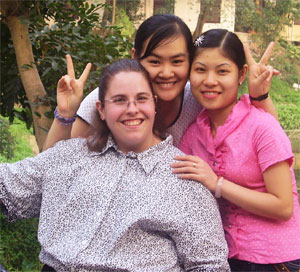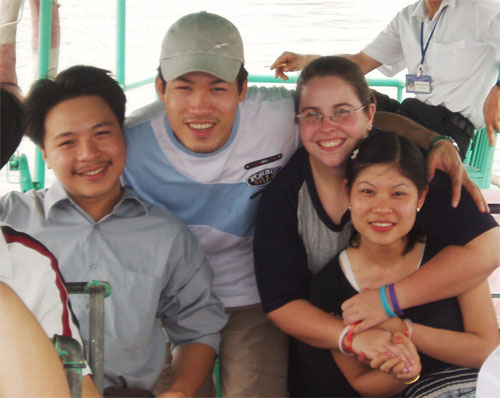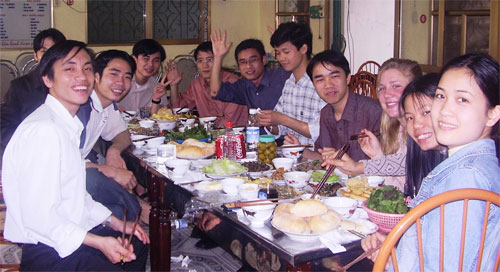 Tabatha Lamb spoke briefly at Anchor this morning. That’s her on the left. Anchor supports three Taylor University-Fort Wayne graduates, all girls, who now serve on the mission field–in Azerbaijan, Haiti, and Vietnam. Tabatha spent a lot of time at Anchor doing volunteer work during her college days. Last summer, she went to Vietnam–to Hanoi. Tabatha is one of my heroes.
Tabatha Lamb spoke briefly at Anchor this morning. That’s her on the left. Anchor supports three Taylor University-Fort Wayne graduates, all girls, who now serve on the mission field–in Azerbaijan, Haiti, and Vietnam. Tabatha spent a lot of time at Anchor doing volunteer work during her college days. Last summer, she went to Vietnam–to Hanoi. Tabatha is one of my heroes.
The work is very difficult–very few Christians, deep cultural opposition to converting to Christianity. She told me of one young woman who had become a Christian and was involved in Bible studies, growing in her faith. But because of opposition from family and friends, she gave it up, renounced everything, and will now state sincerely that while she used to be a Christian, she is not anymore. Stuff like that must be highly discouraging.
Tabatha spoke for only a couple of minutes, and then showed a nine-minute DVD, a collage of photos from her time in Vietnam (she’s going back, by the way). I viewed those photos through two filters, which I should explain first.
1. I grew up during the Vietnam War, and the constant barrage of information from the government and media implanted, deeply, certain impressions of the Vietnamese, especially those in the North with whom we were at war. They were barbaric, psychotic even. No regard for human life. Cruel, primitive, fearless. No hint of being civilized. Attacking with reckless, wild-eyed frenzy. As an adult I know those descriptions aren’t accurate. But that’s what I picked up as an impressionable, patriotic kid.

2. A few days ago I finished the novel “The Sorrow of War,” written by a former North Vietnamese soldier. The author, Bao Ninh, entered the war in 1969 as part of what was called the Glorious 27th Youth Brigade. Of the 500 who went to war, only 10 survived. Bao Ninh’s novel tells the story of a soldier. It is a bit tricky to read, since it jumps back and forth from pre-war, to post-war, to the present, to the war years itself. The book is non-partisan, neither pro-Vietnamese nor anti-American (actually, they do much more fighting with the South Vietnamese than with American troops). The book stirred controversy in Vietnam, since it didn’t portray Vietnamese troops as heroic and noble. But the book achieved international acclaim because of its honesty. The protagonist, Kien, deals with family issues, a girlfriend, the post-war effects of years of bloodshed, fear, despair, hopes and dreams, earning a living, and much more which left me feeling a kinship with Kien. He was just a normal person and a normal soldier (neither bloodthirsty nor particularly heroic), a man who survived the war and had to get on with life. At heart, Kien wasn’t unlike me.
So I watched Tabatha’s photos with a eye for the everyday humanity of the Vietnamese people. Most of the photos were of young people. The Vietnam War ended in 1975; they fought in Cambodia in 1978 to remove the Khmer Rouge from power, and then fought off an invasion of nearly 100,000 Chinese soldiers. But all of that was nearly 30 years ago. Most of the people in Tabatha’s slides appeared younger than that. They smiled a lot–much more than even American kids smile, I thought to myself. They played games, danced, ate, dressed up, mugged for the camera, and laughed.

I looked at some of the young men in her photos, and thought of news reports from the 1960s and 1970s showing American soldiers herding captured Vietnamese soldiers. These guys in Tabatha’s photos, so full of smiles, could have been those so-long-ago POWs, whom I viewed as barbaric, uncivilized, bloodthirsty, and hateful. What was I to do with these pictures of young men who seemed wholly likeable?
I’m not passing judgment on the war and our involvement. That was an entirely different time. You can’t lay the present over those years and render analysis. The Vietnamese did horrible things, and American soldiers did horrible things. That’s what war does to people.
But in Tabatha’s photos, I was looking at peace. As I watched these fun-loving people with the ready smiles, I mused that this was the natural state of people. To laugh, to enjoy each other, to live in peace. Whether they are Asian, African, Palestinian, Russian, or American–young people yearn to smile. We are made for peace. We are made to smile. But we are also made to love Christ, and that’s the crucial element that the Vietnamese are missing. I’m glad Tabatha’s trying to do something about it.





